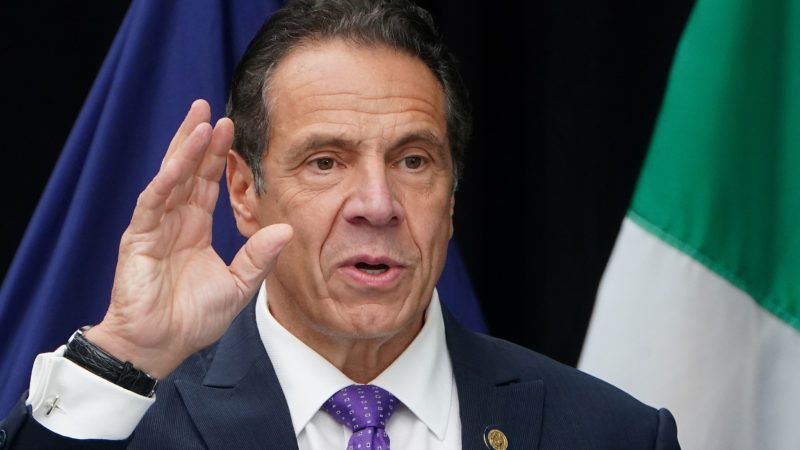Gov. Andrew Cuomo's New COVID-19 Restrictions on Private Home Gatherings Violate Personal Liberty
New York will limit private, in-home gatherings to just 10 people.

With the COVID-19 positivity rate on the rise in New York, Gov. Andrew Cuomo (D) has announced a new wave of restrictions on bars, restaurants, gyms, and other places of public accommodation. But his new coronavirus countermeasures go much further than that: Cuomo has also declared that private gatherings in residences must be limited to no more than 10 people.
The new rule applies to apartments and houses, and goes into effect on Friday, according to the New York Post. Public establishments that serve alcohol will also have to abide by a new 10:00 p.m. curfew.
"If these measures aren't sufficient to reduce the spread—we'll turn the valve more and part of that would be reducing the number of people indoor dining," said Cuomo during a press conference. "If that doesn't work, if these numbers keep going crazy…you will go back to a closedown."
In theory, the bar curfews are intended to curb reckless behavior, because people are more likely to let their guard down and engage in disease-spreading activity after drinking late into the night. In practice, there are plenty of reasons to wonder whether curfews work. What could happen as a result? People could just start their drinking earlier; they may be more likely to crowd if the drinking window is shorter and the rules require them to depart the bar en masse at a relatively early hour; it could incentivize people to socially gather at an indoor home instead of an outdoor bar. Each outcome on its would likely be a net negative for public health.
The residence restrictions, on the other hand, really ought to be opposed on the grounds that they are an odious infringement on personal liberty. Reasonable people—even reasonable libertarians—will disagree on how much and to what extent the government should curtail our behavior in order to fight the pandemic. But telling people what they can and cannot do in their own homes is a bridge too far. If you want to have 25 people over to your apartment for a party, it may be inadvisable (depending on where you live and who you are inviting), but it is your right. A government that can legally prohibit everyone in an entire state from hosting a familial number of guests within their own private residences is essentially unconstrained in a major sphere of American domestic life.
Cuomo's orders have all sorts of problems in that they do not make practical distinctions between large and small residences: An 11-person event in a large, well-ventilated space (perhaps with masks), might not be particularly dangerous, but it is now banned. Some people already live with more than 10 people inside the home. If enforced, these rules very well could be wielded disproportionately against communities that are more likely to encounter the police.
Contrary to his sterling reputation in the mainstream media, Cuomo's approach to the pandemic has not been particularly praiseworthy or science-based: His early actions might have led to a surge of deaths in senior-living facilities, and he recently suggested that news of the vaccine was disappointing since Donald Trump is still president. Bafflingly, Cuomo also insisted that Americans "need someone other than this FDA and this CDC saying it's safe," and that he will work with other governors to delay any attempt by Trump to distribute a vaccine while he is still president. This is deeply irresponsible and puts countless American lives at risk of both infection and deeper economic misery.
It is a matter of basic American principle that there are limits to how far the government can go to promote public safety, and Cuomo has likely exceeded them.
